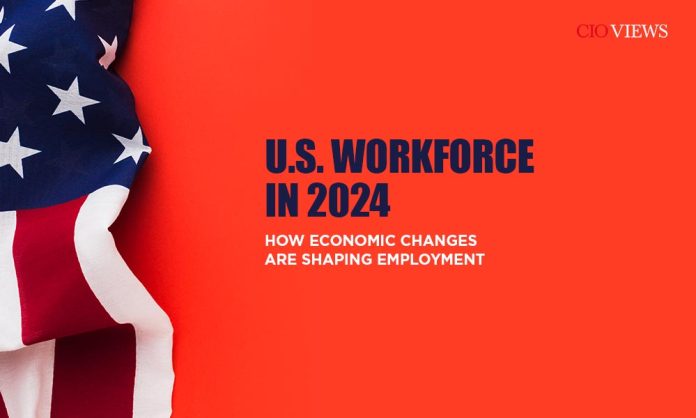The U.S. workforce in 2024 is poised to undergo significant transformations due to various economic changes. These shifts, influenced by technological advances, inflation, and evolving job markets, will redefine employment landscapes across the country.
Understanding these dynamics is crucial for both job seekers and employers. As we explore the intersection of economic changes and employment trends, it becomes clear that adaptability will be key for success in this new era.
Economic Changes Influencing the Workforce
Technological Advancements
In 2024, technology continues to reshape how we work. Automation and artificial intelligence are replacing certain jobs, while simultaneously creating new opportunities.
Industries such as manufacturing and logistics are adopting smart technologies. This leads to enhanced efficiency but requires workers to develop new skills.
Companies are investing in training programs to prepare their workforce for these technological demands. Understanding and leveraging technology will become essential for career advancement.
Inflation and Cost of Living
Rising inflation impacts consumer behavior and employment patterns. As the cost of living increases, workers are seeking higher wages and better benefits.
Employers must adapt by offering competitive salaries and flexible work arrangements to attract talent. This creates a more dynamic labor market, with employees prioritizing job satisfaction alongside financial stability.
Overview of Job Markets
Renewable Energy Sector
The push for sustainability has led to a surge in the renewable energy sector. In 2024, jobs in solar, wind, and energy efficiency are expected to rise significantly.
Government incentives and consumer demand are driving this growth. Workers in these fields will need to possess specialized skills, making relevant training crucial.
As companies transition to greener practices, opportunities for career advancement will increase in this rapidly expanding market.
Healthcare Innovations
Healthcare continues to evolve, particularly in response to an aging population. Innovations in telehealth and personalized medicine are creating new job roles.
Positions in healthcare technology, patient care, and health data analysis are growing. Workers in these fields will need a blend of technical and interpersonal skills to thrive in this changing landscape.
Skills in Demand for 2024
Soft Skills vs. Hard Skills
As industries transform, the demand for both soft and hard skills rises. While technical skills are essential, soft skills such as communication and problem-solving are equally important.
Employers are increasingly looking for candidates who can collaborate effectively in team settings. This emphasis on interpersonal abilities is reshaping hiring practices across sectors.
Lifelong Learning and Adaptability
In 2024, lifelong learning will be crucial for career success. Workers must continuously update their skills to remain relevant in a fast-paced job market.
Employers are encouraged to support their staff’s professional development. This commitment to adaptability ensures a resilient workforce capable of responding to future challenges.
Challenges Facing the Workforce
Unemployment Rates
Despite a recovering economy, unemployment remains a concern. Certain industries are facing significant disruptions, resulting in job losses.
Programs aimed at reskilling workers are essential. Addressing these challenges will help mitigate the impact on individuals and communities.
The Gig Economy
The rise of the gig economy presents both opportunities and challenges. Many workers are turning to freelance or contract work for flexibility.
However, this shift raises concerns about job security and benefits. Policymakers are exploring solutions to provide support for gig workers, ensuring they have access to necessary protections.
US Job Recession Coming Soon
The U.S. job market is currently facing significant challenges as concerns about a potential recession loom. Recent economic indicators suggest a slowdown in hiring, with companies implementing hiring freezes and layoffs in response to rising inflation and fluctuating consumer demand. Sectors such as technology and retail are particularly affected, leading to increased uncertainty for job seekers. This downturn is marked by a growing disparity between skilled and unskilled labor opportunities, as employers prioritize positions that require specialized skills. As the economy grapples with these pressures, the resilience of the job market will be tested, prompting both workers and businesses to adapt to a changing landscape.
The U.S. workforce in 2024 is being shaped by economic changes that require both adaptability and foresight. As new job markets emerge and skills evolve, workers must remain proactive in their career development.
Employers too must recognize these trends to attract and retain talent. By understanding and responding to the shifting landscape, all stakeholders can contribute to a more robust and dynamic workforce.





